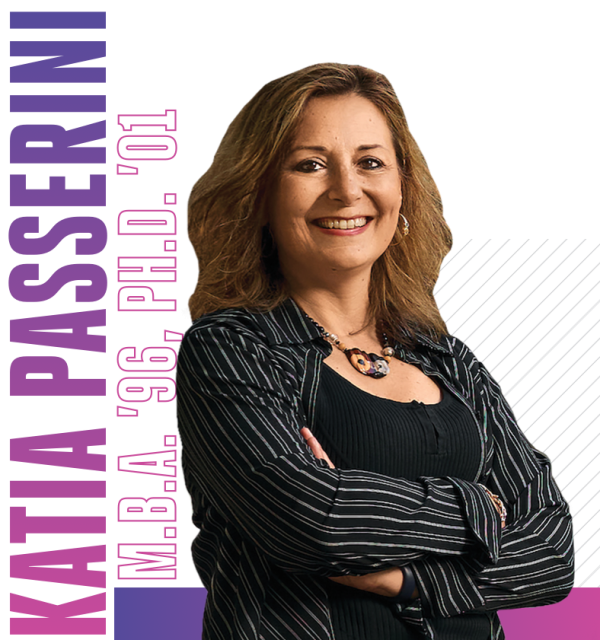The Power of Possibility
The Power of Possibility
At GW, Katia Passerini, found her future. Today, she’s shaping Gonzaga University’s.
/ / by Lisa Conley-Kendzior

When Katia Passerini, M.B.A. ’96, Ph.D. ’01, packed her bags for a one-year program at GW, she never imagined it would set her on the path to becoming a university president. A political science major from Rome, she had expected to return to Italy and pursue a career in journalism. Instead, that year in Washington introduced her to mentors, ideas and opportunities that would eventually put her at the helm of one of the nation’s most respected Jesuit institutions.

Early Roots in Education
Passerini’s path toward academia began long before GW. Raised in Rome by parents who were both teachers-turned-superintendents, she grew up in classrooms and faculty lounges, surrounded by conversations about learning. She remembers sitting in her mother’s class, where multiplication tables turned into soccer games, a ball tossed between students to keep them engaged. “My natural socialization was at the table, doing homework,” she says. “I loved it. I thought it was fun.”
Still, journalism was her first ambition. That changed at GW, where faculty mentors encouraged her to think differently. “Every time I had an idea, people were willing to listen. If the idea was good, they supported it. If it was bad, they told you quickly,” she explains. “That made me realize this was a place where I could excel for who I am, not just where I came from.”
She stayed to complete her M.B.A., then earned a Ph.D. in information systems. Working closely with longtime GW professor Mary Granger cemented her desire to remain in academia. “She was an incredible mentor,” Passerini recalls. “She showed me you could be an accomplished scholar and also have a full life outside of work. That was inspiring.”
Her early research focused on the U.S. and Italian health care systems during the Clinton-era reform debates, which connected her with the RAND Corporation and reinforced her interest in bridging theory and practice. After a brief return to Italy, she began her faculty career in the U.S. as a professor and Hurlburt Chair of Management Information Systems at the New Jersey Institute of Technology (NJIT).
Leadership opportunities soon followed. She served as dean of NJIT’s Albert Dorman Honors College, then moved to St. John’s University as dean of the Collins College of Professional Studies, where she expanded interdisciplinary programs and strengthened industry partnerships.
In 2020, she became provost and executive vice president at Seton Hall University, where she led an ambitious academic restructuring known as the “Seeds of Innovation.” The effort merged schools, launched new degrees and freed resources for faculty hiring. “Change is always difficult,” she acknowledges, “but it energized the community and prepared us for the future.”
Those lessons in leading through transition set the stage for her biggest challenge yet: the presidency of Gonzaga University.
“When I came to GW, everyone in my classes was from another part of the world. You felt like you were in the center of everything. That’s the kind of experience I’d love to replicate.”
— Katia Passerini, M.B.A. ’96, Ph.D. ’01

Leading Gonzaga
Passerini became Gonzaga University’s 27th president in July, assuming the role at a time when higher education is navigating shifting demographics, financial pressures and the disruptive potential of emerging technologies. Guided by the Jesuit and humanistic traditions that define the university’s mission, she views these challenges as opportunities. “There’s a very strong notion of public good and social justice at the heart of Jesuit education,” she says. “It’s about changing society in ways that have the greatest impact.”
Her priorities as president reflect her own GW experience: she hopes to expand Gonzaga’s study abroad offerings and attract more international students, creating the kind of globally engaged learning environment in which she once thrived. “When I came to GW, everyone in my classes was from another part of the world. You felt like you were in the center of everything,” she recalls. “That’s the kind of experience I’d love to replicate.”
That global perspective also informs her approach to technology. A self-described “technophile,” Passerini sees artificial intelligence not as a threat but as a tool to deepen learning. “AI is just another evolution,” she says. “It can help us do new things, as long as we set boundaries to ensure students are still learning deeply.” Gonzaga has already launched an institute for informatics and applied technology to explore AI’s potential across various fields, from education to healthcare.
Her vision extends beyond academics. Athletics, she says, are a key expression of cura personalis, care for the whole person. As Gonzaga prepares to join the Pac-12, she emphasizes that sports are about more than competition: “It’s about balancing body, mind and spirit, and preparing students for life beyond the court.”
But despite her many accomplishments, Passerini admits that she still struggles with imposter syndrome. She recalls being asked to serve as an Eucharistic minister during Gonzaga’s Mass of the Holy Spirit and suddenly finding herself offering blessings to students. “I kept asking, ‘Who am I to bless them?’” she says. “But over and over, I’ve been given the opportunity to serve. All I can do is try to do my best.”
And through it all, she carries GW with her. “GW changed my life,” she says with a smile. “I met my husband there, I found mentors who inspired me, and I discovered that I could build a career in higher education. I’ll always be grateful.”
Photo provided by Gonzaga University

